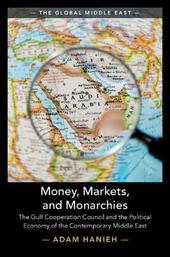
|
Money, Markets, and Monarchies: The Gulf Cooperation Council and the Political Economy of the Contemporary Middle East
Paperback / softback
Main Details
| Title |
Money, Markets, and Monarchies: The Gulf Cooperation Council and the Political Economy of the Contemporary Middle East
|
| Authors and Contributors |
By (author) Adam Hanieh
|
| Series | The Global Middle East |
|---|
| Physical Properties |
| Format:Paperback / softback | | Pages:314 | | Dimensions(mm): Height 228,Width 151 |
|
| Category/Genre | International economics
Political economy
Economic systems and structures |
|---|
| ISBN/Barcode |
9781108453158
|
| Classifications | Dewey:337.1536 |
|---|
| Audience | | Tertiary Education (US: College) | | Professional & Vocational | |
|---|
| Illustrations |
Worked examples or Exercises; 25 Tables, black and white; 5 Line drawings, black and white
|
|
Publishing Details |
| Publisher |
Cambridge University Press
|
| Imprint |
Cambridge University Press
|
| Publication Date |
13 September 2018 |
| Publication Country |
United Kingdom
|
Description
Framed by a critical analysis of global capitalism, this book examines how the six states of the Gulf Cooperation Council are powerfully shaping the political economy of the wider Middle East. Through unprecedented and fine-grained empirical research - encompassing sectors such as agribusiness, real estate, finance, retail, telecommunications, and urban utilities - Adam Hanieh lays out the pivotal role of the Gulf in the affairs of other Arab states. This vital but little recognised feature of the Middle East's political economy is essential to understanding contemporary regional dynamics, not least of which is the emergence of significant internal tensions within the Gulf itself. Bringing fresh insights and a novel interdisciplinary approach to debates across political economy, critical geography, and Middle East studies, this book fills an important gap in how we understand the region and its place in the global order.
Author Biography
Adam Hanieh is a Reader in Development Studies at the School of Oriental and African Studies, University of London. He holds a Ph.D. in Political Science from York University, Canada and his research examines the political economy of the Middle East, with a particular focus on the states of the Gulf Cooperation Council. His recent books include Capitalism and Class in the Gulf Arab States (2011); Lineages of Revolt: Issues of Contemporary Capitalism in the Middle East (2013); and (co-edited) Transit States: Labour, Migration and Citizenship in the Gulf ( 2014).
Reviews'This brilliant book by one of the most thoughtful scholars of the Gulf states is deeply researched, coruscatingly lucid, and profoundly important. It shows all the ways in which Gulf capital permeates and shapes Middle Eastern economies, in the agricultural, construction, industrial and banking sectors. It carefully traces the processes of financialisation that are so fundamental to Gulf capital accumulation and shows the political effects of Gulf capital's economic power. In so doing Hanieh casts an urgently needed light on the machinery of Middle Eastern political economy and social relations.' Laleh Khalili, School of Oriental and African Studies, University of London 'Framed by a sophisticated spatial analysis that rejects a sharp distinction between class and state, Adam Hanieh decisively establishes that we cannot understand the Gulf solely through the lens of oil. The GCC countries have become increasingly prominent in the international circulation of money, commodities, and people. Money, Markets, and Monarchies demonstrates that Gulf capital is a central factor in both global capitalism and the broader political economy of the Middle East and North Africa. Money, Markets, and Monarchies should change the way we view the region and its place in the world.' Joel Beinin, Stanford University, California 'In this well researched and lucid book, Hanieh convincingly illustrates how the GCC is embedded in international and regional circuits of accumulation. By stitching together various vectors of neoliberal capitalism, Money, Markets, and Monarchies, helps us understand how class relations are reproduced within the Gulf region as well as the Arab Middle East. As such, it is essential reading for scholars of the Middle East as well as all who are interested in the processes that have produced wealth and inequalities internationally in recent decades.' Arang Keshavarzian, author of Bazaar and State in Iran: the Politics of the Tehran Marketplace
|